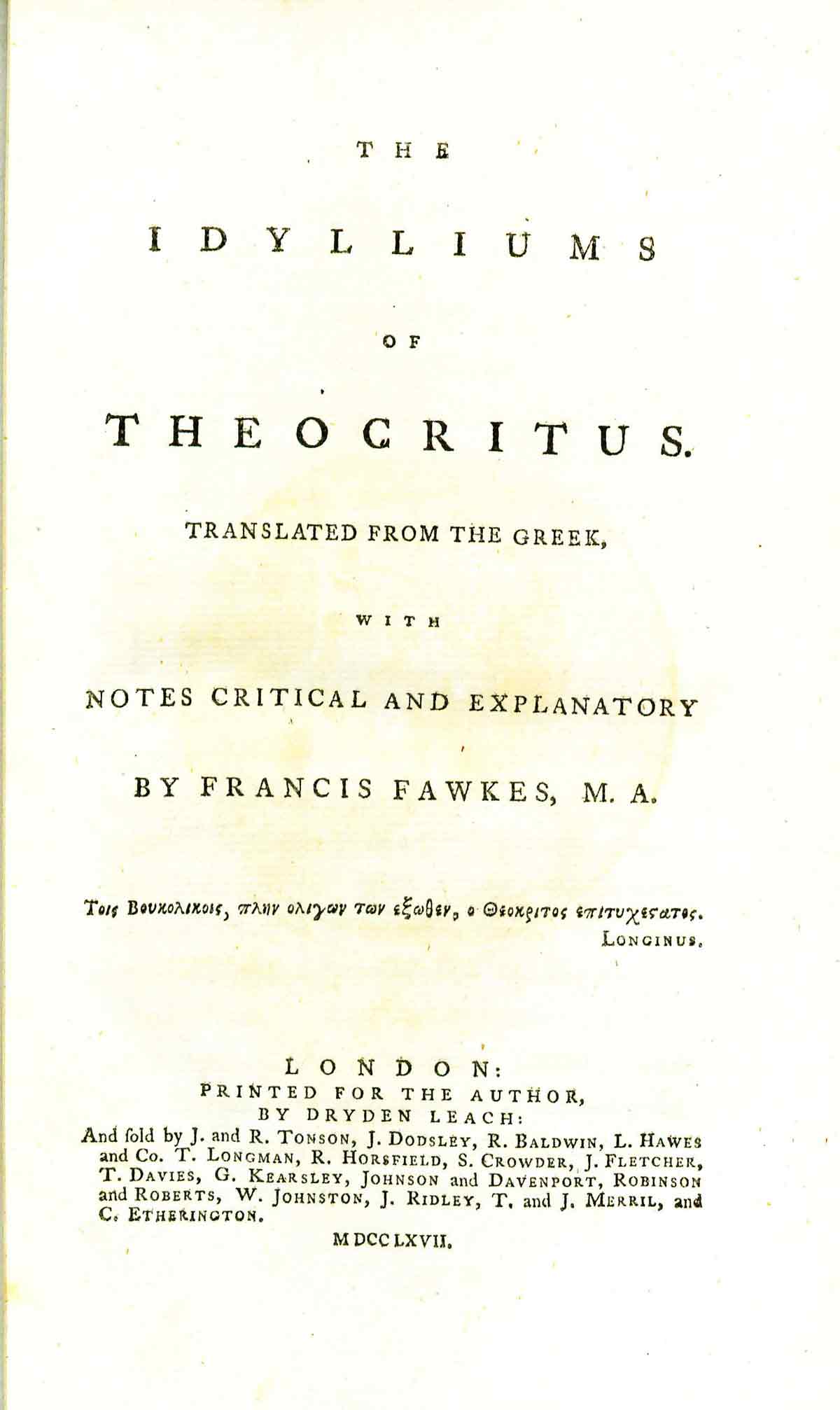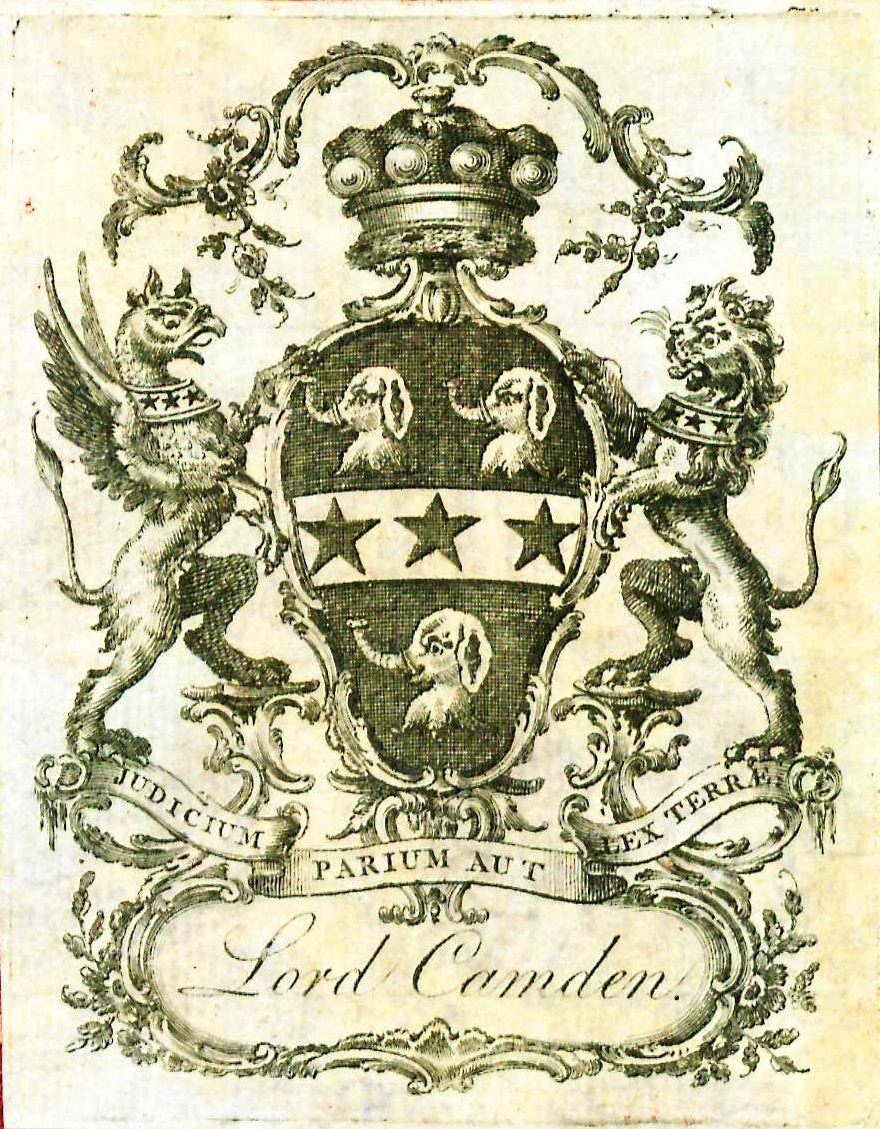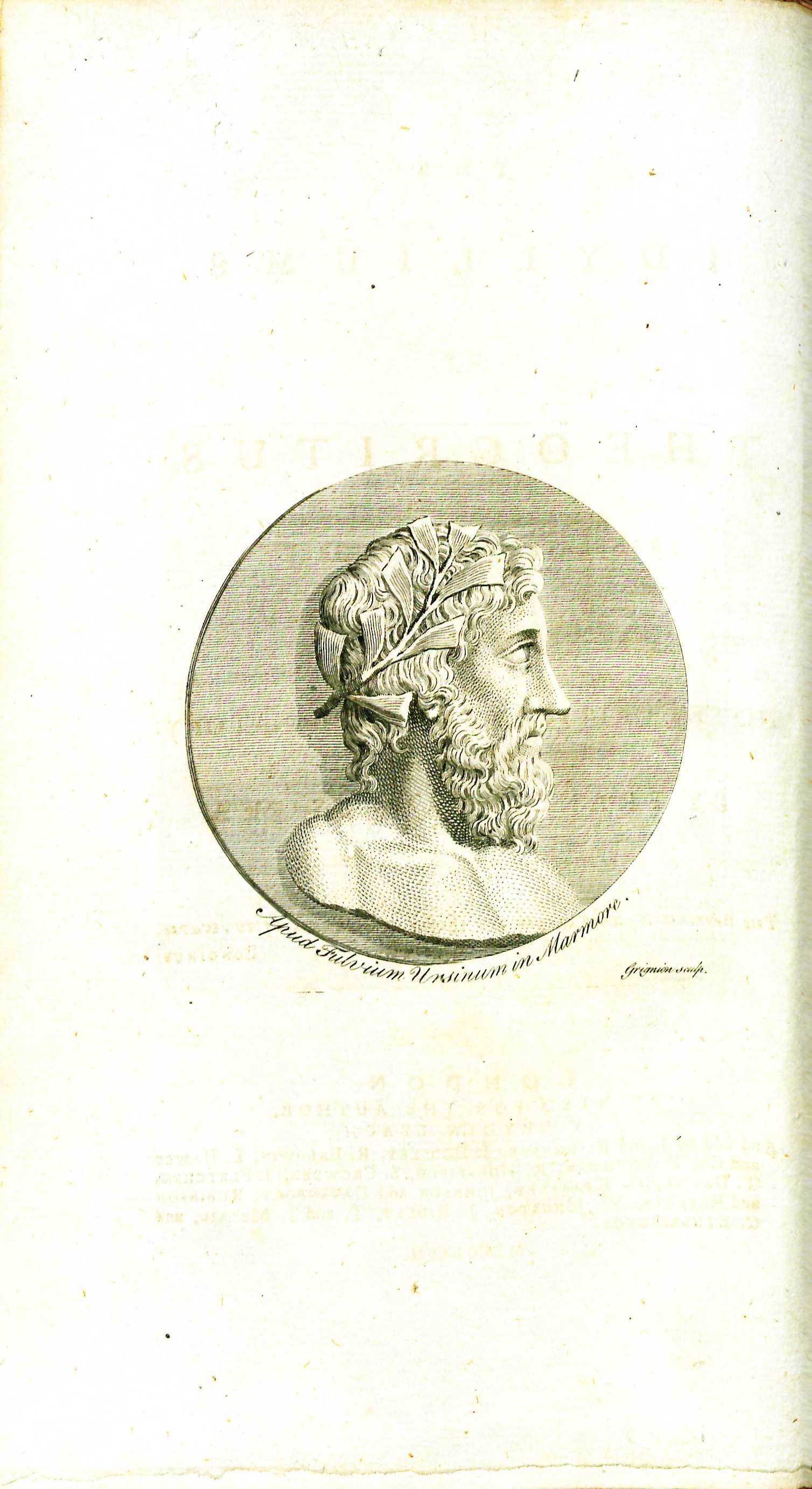Difference between revisions of "Idylliums of Theocritus"
Lewarkentin (talk | contribs) (→See also) |
m |
||
| (7 intermediate revisions by 5 users not shown) | |||
| Line 4: | Line 4: | ||
{{BookPageInfoBox | {{BookPageInfoBox | ||
|imagename=TheocritusIdylliums1767.jpg | |imagename=TheocritusIdylliums1767.jpg | ||
| − | |link=https:// | + | |link=https://wm.primo.exlibrisgroup.com/permalink/01COWM_INST/g9pr7p/alma991017620439703196 |
|shorttitle=The Idylliums of Theocritus | |shorttitle=The Idylliums of Theocritus | ||
| − | |author=Theocritus | + | |author=[[:Category:Theocritus|Theocritus]] |
|trans=Francis Fawkes | |trans=Francis Fawkes | ||
| − | |editor=Francis Fawkes and Samuel Johnson | + | |editor=[[:Category:Francis Fawkes|Francis Fawkes]] and [[:Category:Samuel Johnson|Samuel Johnson]] |
| − | |publoc=London | + | |publoc=[[:Category:London|London]] |
|publisher=Printed for the author by D. Leach and sold by J. and R. Tonson | |publisher=Printed for the author by D. Leach and sold by J. and R. Tonson | ||
|year=1767 | |year=1767 | ||
| − | |lang=English | + | |lang=[[:Category:English|English]] |
|pages=lvi, [12], 288 | |pages=lvi, [12], 288 | ||
| − | |desc=8vo (21 cm.) | + | |desc=[[:Category:Octavos|8vo]] (21 cm.) |
|shelf=I-4 | |shelf=I-4 | ||
}}{{BookPageBookplate | }}{{BookPageBookplate | ||
| Line 20: | Line 20: | ||
|display=left | |display=left | ||
|caption=Armorial bookplate of Lord Camden, front pastedown. | |caption=Armorial bookplate of Lord Camden, front pastedown. | ||
| − | }}[http://en.wikipedia.org/wiki/Theocritus Theocritus] was a Hellenistic Greek poet who lived in the first half of the third century BCE in Syracuse on the island of Sicily.<ref>[http://www.oxfordreference.com/view/10.1093/acref/9780199548545.001.0001/acref-9780199548545-e-2903 "Theo'critus”] in ''The Oxford Companion to Classical Literature'', ed. by M.C. Howatson (Oxford: Oxford University Press, 2011).</ref> It is possible that Theocritus lived in south Italy for part of his life, and that he visited Alexandria, Egypt during the reign of Ptolemy II Philadelphus.<ref>Ibid.</ref> Several of Theocritus’ poems are set in Alexandria and directly reference Ptolemy’s palace and life under his rule, specifically poems 15 and 17.<ref>[http://www.oxfordreference.com/view/10.1093/acref/9780192801463.001.0001/acref-9780192801463-e-2159 "Theocritus"] in ''Oxford Dictionary of the Classical World'', ed. by John Roberts (Oxford: Oxford University Press, 2007).</ref | + | }}[http://en.wikipedia.org/wiki/Theocritus Theocritus] was a Hellenistic Greek poet who lived in the first half of the third century BCE in Syracuse on the island of Sicily.<ref>[http://www.oxfordreference.com/view/10.1093/acref/9780199548545.001.0001/acref-9780199548545-e-2903 "Theo'critus”] in ''The Oxford Companion to Classical Literature'', ed. by M.C. Howatson (Oxford: Oxford University Press, 2011).</ref> It is possible that Theocritus lived in south Italy for part of his life, and that he visited Alexandria, Egypt during the reign of Ptolemy II Philadelphus.<ref>Ibid.</ref> Several of Theocritus’ poems are set in Alexandria and directly reference Ptolemy’s palace and life under his rule, specifically poems 15 and 17.<ref>[http://www.oxfordreference.com/view/10.1093/acref/9780192801463.001.0001/acref-9780192801463-e-2159 "Theocritus"] in ''Oxford Dictionary of the Classical World'', ed. by John Roberts (Oxford: Oxford University Press, 2007).</ref> |
| − | + | ||
| − | Theocritus invented the genre of pastoral or bucolic poetry that focused on artfully simplistic depictions of herdsmen singing of “themselves, their loves and quarrels.”<ref>[http://www.oxfordreference.com/view/10.1093/acref/9780199548545.001.0001/acref-9780199548545-e-2257 "pastoral poetry”] in ''The Oxford Companion to Classical Literature'', ed. by M.C. Howatson (Oxford: Oxford University Press, 2011).</ref> Due to the relatively limited subject matter, bucolic poetry became used for allegorical comments on society and politics around the time of Virgil.<ref>Ibid.</ref> Theocritus’ extant works include thirty poems, several fragments of poems, and twenty-four epigrams, though the authenticity of all of them is doubtful.<ref>"Theocritus" in ''Oxford Dictionary of the Classical World''.</ref> | + | Theocritus invented the genre of pastoral or bucolic poetry that focused on artfully simplistic depictions of herdsmen singing of “themselves, their loves and quarrels.”<ref>[http://www.oxfordreference.com/view/10.1093/acref/9780199548545.001.0001/acref-9780199548545-e-2257 "pastoral poetry”] in ''The Oxford Companion to Classical Literature'', ed. by M.C. Howatson (Oxford: Oxford University Press, 2011).</ref> Due to the relatively limited subject matter, bucolic poetry became used for allegorical comments on society and politics around the time of Virgil.<ref>Ibid.</ref> Theocritus’ extant works include thirty poems, several fragments of poems, and twenty-four epigrams, though the authenticity of all of them is doubtful.<ref>"Theocritus" in ''Oxford Dictionary of the Classical World''.</ref> |
| − | + | ||
''The Idylliums of Theocritus'' was translated from the original Ancient Greek to English by the English reverend Francis Fawkes in 1767.<ref>A.T. Hazen and T.O. Mabbott, “Dr. Johnson and Francis Fawkes’s Theocritus,” ''The Review of English Studies'' 21, no. 82 (Apr. 1945): 142).</ref> Fawkes’ translation is notable for being extensively annotated, but not just by himself; he received “the particular help of ten contemporary men of letters” as indicated in his preface.<ref>Ibid.</ref> Dr. Samuel Johnson is considered a major contributor, and he is often included in the by-line. Fawkes refers to Johnson specifically in the preface for his editing and annotating contributions.<ref>Ibid.</ref> The first portion of the book includes an explanation of Theocritus’s life and pastoral poetry, followed by his thirty poems and twenty-two of his twenty-four epigrams. | ''The Idylliums of Theocritus'' was translated from the original Ancient Greek to English by the English reverend Francis Fawkes in 1767.<ref>A.T. Hazen and T.O. Mabbott, “Dr. Johnson and Francis Fawkes’s Theocritus,” ''The Review of English Studies'' 21, no. 82 (Apr. 1945): 142).</ref> Fawkes’ translation is notable for being extensively annotated, but not just by himself; he received “the particular help of ten contemporary men of letters” as indicated in his preface.<ref>Ibid.</ref> Dr. Samuel Johnson is considered a major contributor, and he is often included in the by-line. Fawkes refers to Johnson specifically in the preface for his editing and annotating contributions.<ref>Ibid.</ref> The first portion of the book includes an explanation of Theocritus’s life and pastoral poetry, followed by his thirty poems and twenty-two of his twenty-four epigrams. | ||
==Evidence for Inclusion in Wythe's Library== | ==Evidence for Inclusion in Wythe's Library== | ||
| − | Ordered by Wythe from John Norton & Sons in a [[Wythe to John Norton, 15 May 1768|letter]] dated May 15, 1768. Records indicate the order was fulfilled.<ref>Frances Norton Mason, ed., ''John Norton & Sons, Merchants of London and Virginia: Being the Papers from their Counting House for the Years 1750 to 1795'' (Richmond, Virginia: Dietz Press, 1937), 101. The letter is endorsed "Virginia 15th May 1768/ George Wythe / Rec'd ye 8th July / Goods entd. pa: 452 / Ansd. the 1 August 1768 pr. Woodford."</ref> Also listed in the [[Jefferson Inventory]] of [[Wythe's Library]] as "Fawke's Theocritus. 8vo." and kept by [[Thomas Jefferson]] He later sold a copy of the same title to the Library of Congress in 1815, but it no longer exists to verify Wythe's prior ownership.<ref>E. Millicent Sowerby, ''Catalogue of the Library of Thomas Jefferson'' | + | Ordered by Wythe from John Norton & Sons in a [[Wythe to John Norton, 15 May 1768|letter]] dated May 15, 1768. Records indicate the order was fulfilled.<ref>Frances Norton Mason, ed., ''John Norton & Sons, Merchants of London and Virginia: Being the Papers from their Counting House for the Years 1750 to 1795'' (Richmond, Virginia: Dietz Press, 1937), 101. The letter is endorsed "Virginia 15th May 1768/ George Wythe / Rec'd ye 8th July / Goods entd. pa: 452 / Ansd. the 1 August 1768 pr. Woodford."</ref> Also listed in the [[Jefferson Inventory]] of [[Wythe's Library]] as "Fawke's Theocritus. 8vo." and kept by [[Thomas Jefferson]] He later sold a copy of the same title to the Library of Congress in 1815, but it no longer exists to verify Wythe's prior ownership.<ref>E. Millicent Sowerby, ''Catalogue of the Library of Thomas Jefferson'' (Washington, D.C.: The Library of Congress, 1952-1959), 4:468 [[http://babel.hathitrust.org/cgi/pt?id=mdp.39015033648125;view=1up;seq=488 no.4381]].</ref>Both the Brown Bibliography<ref>Bennie Brown, "The Library of George Wythe of Williamsburg and Richmond," (unpublished manuscript, May, 2012) Microsoft Word file. Earlier edition available at: https://digitalarchive.wm.edu/handle/10288/13433</ref> and [http://www.librarything.com/profile/GeorgeWythe George Wythe's Library]<ref>''LibraryThing'', s. v. [http://www.librarything.com/profile/GeorgeWythe "Member: George Wythe"], accessed on February 27, 2014.</ref> on LibraryThing, include the 1767 edition of ''The Idylliums of Theocritus'' translated by Francis Fawkes. The Wolf Law Library concurred with their identification and purchased a copy of this volume. |
[[File:TheocritusIdylliumsOfTheocritus1767Frontispiece.jpeg|left|thumb|200px|<center>Frontispiece.</center>]] | [[File:TheocritusIdylliumsOfTheocritus1767Frontispiece.jpeg|left|thumb|200px|<center>Frontispiece.</center>]] | ||
| Line 33: | Line 33: | ||
Bound in contemporary tree calf with gilt border on boards. Spine features six raised bands and gilt floral motifs to compartments. Red morocco label has gilt lettering. The front pastedown includes the armorial bookplate of [https://en.wikipedia.org/wiki/Charles_Pratt,_1st_Earl_Camden Charles Pratt, 1st Earl Camden], an English lawyer and judge who held the offices of Chief Justice of the Common Pleas, Attorney-General and Lord Chancellor. The bookplate's Latin motto "Judicum parium aut lex terrae" translates as "The judgment of my peers or the law of the land." | Bound in contemporary tree calf with gilt border on boards. Spine features six raised bands and gilt floral motifs to compartments. Red morocco label has gilt lettering. The front pastedown includes the armorial bookplate of [https://en.wikipedia.org/wiki/Charles_Pratt,_1st_Earl_Camden Charles Pratt, 1st Earl Camden], an English lawyer and judge who held the offices of Chief Justice of the Common Pleas, Attorney-General and Lord Chancellor. The bookplate's Latin motto "Judicum parium aut lex terrae" translates as "The judgment of my peers or the law of the land." | ||
| − | View the record for this book in [https:// | + | Images of the library's copy of this book are [https://www.flickr.com/photos/wolflawlibrary/albums/72157637448846556 available on Flickr.] View the record for this book in [https://wm.primo.exlibrisgroup.com/permalink/01COWM_INST/g9pr7p/alma991017620439703196 William & Mary's online catalog.] |
==See also== | ==See also== | ||
| Line 44: | Line 44: | ||
==References== | ==References== | ||
| + | <div style="overflow: hidden;"> | ||
<references/> | <references/> | ||
| + | </div> | ||
==External Links== | ==External Links== | ||
Read this book from the [http://babel.hathitrust.org/cgi/pt?id=hvd.hweucj;view=1up;seq=13 Hathi Trust.] | Read this book from the [http://babel.hathitrust.org/cgi/pt?id=hvd.hweucj;view=1up;seq=13 Hathi Trust.] | ||
| + | [[Category:Francis Fawkes]] | ||
[[Category:George Wythe Collection at William & Mary's Wolf Law Library]] | [[Category:George Wythe Collection at William & Mary's Wolf Law Library]] | ||
[[Category:Greek Literature]] | [[Category:Greek Literature]] | ||
| + | [[Category:Jefferson's Books]] | ||
| + | [[Category:Samuel Johnson]] | ||
| + | [[Category:Theocritus]] | ||
[[Category:Titles in Wythe's Library]] | [[Category:Titles in Wythe's Library]] | ||
| + | |||
| + | [[Category:English]] | ||
| + | [[Category:London]] | ||
| + | [[Category:Octavos]] | ||
Latest revision as of 14:42, 28 October 2021
by Theocritus
| The Idylliums of Theocritus | |
|
Title page from The Idylliums of Theocritus, George Wythe Collection, Wolf Law Library, College of William & Mary. | |
| Author | Theocritus |
| Editor | Francis Fawkes and Samuel Johnson |
| Translator | Francis Fawkes |
| Published | London: Printed for the author by D. Leach and sold by J. and R. Tonson |
| Date | 1767 |
| Language | English |
| Pages | lvi, [12], 288 |
| Desc. | 8vo (21 cm.) |
| Location | Shelf I-4 |
Theocritus was a Hellenistic Greek poet who lived in the first half of the third century BCE in Syracuse on the island of Sicily.[1] It is possible that Theocritus lived in south Italy for part of his life, and that he visited Alexandria, Egypt during the reign of Ptolemy II Philadelphus.[2] Several of Theocritus’ poems are set in Alexandria and directly reference Ptolemy’s palace and life under his rule, specifically poems 15 and 17.[3]
Theocritus invented the genre of pastoral or bucolic poetry that focused on artfully simplistic depictions of herdsmen singing of “themselves, their loves and quarrels.”[4] Due to the relatively limited subject matter, bucolic poetry became used for allegorical comments on society and politics around the time of Virgil.[5] Theocritus’ extant works include thirty poems, several fragments of poems, and twenty-four epigrams, though the authenticity of all of them is doubtful.[6]
The Idylliums of Theocritus was translated from the original Ancient Greek to English by the English reverend Francis Fawkes in 1767.[7] Fawkes’ translation is notable for being extensively annotated, but not just by himself; he received “the particular help of ten contemporary men of letters” as indicated in his preface.[8] Dr. Samuel Johnson is considered a major contributor, and he is often included in the by-line. Fawkes refers to Johnson specifically in the preface for his editing and annotating contributions.[9] The first portion of the book includes an explanation of Theocritus’s life and pastoral poetry, followed by his thirty poems and twenty-two of his twenty-four epigrams.
Evidence for Inclusion in Wythe's Library
Ordered by Wythe from John Norton & Sons in a letter dated May 15, 1768. Records indicate the order was fulfilled.[10] Also listed in the Jefferson Inventory of Wythe's Library as "Fawke's Theocritus. 8vo." and kept by Thomas Jefferson He later sold a copy of the same title to the Library of Congress in 1815, but it no longer exists to verify Wythe's prior ownership.[11]Both the Brown Bibliography[12] and George Wythe's Library[13] on LibraryThing, include the 1767 edition of The Idylliums of Theocritus translated by Francis Fawkes. The Wolf Law Library concurred with their identification and purchased a copy of this volume.
Description of the Wolf Law Library's copy
Bound in contemporary tree calf with gilt border on boards. Spine features six raised bands and gilt floral motifs to compartments. Red morocco label has gilt lettering. The front pastedown includes the armorial bookplate of Charles Pratt, 1st Earl Camden, an English lawyer and judge who held the offices of Chief Justice of the Common Pleas, Attorney-General and Lord Chancellor. The bookplate's Latin motto "Judicum parium aut lex terrae" translates as "The judgment of my peers or the law of the land."
Images of the library's copy of this book are available on Flickr. View the record for this book in William & Mary's online catalog.
See also
References
External Links
Read this book from the Hathi Trust.


